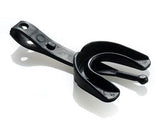In order to make the most effective use of our limited time with our teams, it is imperative that as the coach, we arrive prepared and ready to accomplish our practice goals. One of the ways we can do that is by coming with all the necessary equipment in our coaching gear bag. With all that is occupying our thoughts, it is easy to overlook vital pieces of equipment that are often forgotten until desperately needed.
Here is a list of some of the items that we need to have in our coaching bags:
Mouth Guards
Regardless of age level, the most important piece of safety equipment that you must carry a reserve supply of is the mouth guard. Since they are often left at home by players, there will come a need for an extra mouth guard during your practice or game. Not having spare mouth guards could leave you without a player or two.
Common issues with mouth guards, besides being forgotten at home, include loss on the field, breakage during play, or even blood exposure from an accidental injury.
Put a few extra mouth guards in your equipment bag for emergency use. You can find all types of mouth guards for sale, however a basic mouth guard like our youth mouth guards will be perfect for use in all situations.
Cones
If you plan on running any type of drills during practice, you will want a stack of cones in your coaches’ gear bag. Whether you are setting up a drill or condensing playing space, a stack of cones will come in handy.
You can also use cones for teaching plays and position skills. Using our position identifying collapsible colored plastic cones and wristbands, you can teach any player their responsibilities with color coordinated assistance.
Ball Pump
When it is least expected, your footballs will start deflating and this could cost you valuable practice time. Be prepared by having a pump on hand at all times and extra inflation needles to get them pumped back up. Also, do not depend on one or two inflation needles to get the job done, as they bend and break easily, or get lost.
Practice “Penny” Vests
Nothing is more frustrating and counter-productive as setting up a drill to teach your team something and find them all blending together. Carry enough practice vests to differentiate the players onto separate teams for an easier time identifying the offense and defense.
Rule Book
We can never remember everything, but we are expected to have all the answers. Make sure you keep a copy of your league’s rule book on hand as an immediate resource should you have a question arise while out on the field. If possible, keep it in a Ziploc bag to weatherproof it. If you need an online resource for flag football rules, you can see our copy here.

First Aid Kit
As Coach, you are the leader of the team. You hold responsibility for all of the athletes that you are coaching. This doesn’t just mean improving their athletic performance, but also ensuring their safety. Football is a physical sport and injuries will happen, so be prepared for them. Always have a first aid kit on scene with you, whether it be at a game or practice.
Make sure your first aid kit includes bandages, athletic tape, and ice packs. Injuries from scrapes and cuts, to broken bones, can be expected and you will be the first responder on scene. Make sure you have the basic safety equipment to take care of your athletes until professional assistance is received.
MomsTeam.com, a website noted as being a “Trusted Source for Sports Parents,” shares an idea of what contents should be in your coaching bag first aid kit.
Emergency Contact Information
Finally, because accidents will happen in any dynamic athletic sporting event, you must keep your athlete’s emergency contact information with you at all times while they are under your supervision. Make sure it is safely stowed in a weather-resistant manner and with you at field side.
Do not keep it in your car near the field or with another “team parent,” but with you. At a moment’s notice, you, or an emergency service professional, may need this information, and not having it on scene could be very troublesome in the event of an emergency.
Comments